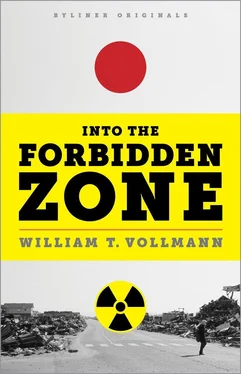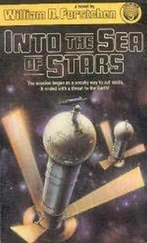I wondered whether she had time to play for me on her koto, but the instrument had been submerged in the filthy wave. Right now it was under repair. Very softly she said: “A koto is like a living thing to me, so I was very sad. We lost our dog, but when I saw the koto so dirty with mud I felt so sad. .”
I asked her sons which possessions they themselves had been the most distressed to lose. “All!” they laughed cheerfully. Since not enough chairs remained, they stood around us inside that dark and chilly ruin with its bitter stench of dust.
And what did they all think about the reactor accident?
“I think the fact that it occurred cannot be helped,” the mother said. “I want Tepco to work hard and the vegetables to be grown again. I would like to buy the vegetables from Fukushima, but. .”
“Do you think it will become contaminated here?”
“Yes,” she said.
“What will you do?”
“We have nowhere else to go.”
“Have you suffered any nightmares?” I asked her.
“In my case, I didn’t see the tsunami with my own eyes. I wasn’t able to return home for two days, so I didn’t experience that, but the fire, well, we could see it so vividly from our hill 24that I was almost afraid it might come to us; at three in the morning there was an announcement that the flame might come to us, so we evacuated.”
“But no nightmares?”
“No. The fire burned two days. .”
“I cannot live in our home,” Mrs. Utsumi said later. “It’s too scary. I cannot live there again, even if we have to build a new house. .”
Not knowing what else to say, I repeated that she was brave, and she said, “I think that if we live decently, that will give my mother-in-law peace of mind. She would not have wanted an expensive coffin for her temporary burial; she would have preferred to have the money go to her grandchildren.”
I nodded. The dust ached in my chest.
“To console my dead mother-in-law, I would like my two sons to work hard to rebuild this city.”
One saw small germinations of this stoically and at times quixotically resurgent impulse here and there in Ishinomaki; I remember a gang of workmen with white rags around their foreheads, dragging soaked tatamis out of a warehouse, needing a wheelbarrow and a man on each end, such was the water weight; and then the car rolled down past a wide hill of garbage, many men in rubber boots standing in a puddled courtyard, waiting for I know not what; but less than a month had passed since the tidal wave, so that more conspicuous than these were the antediluvian survivals: for example, the age- or diesel-blackened torus of a small shrine standing alone in the mud struck me with déjà vu, and later I remembered an image made by the great photographer Yamahata Yosuke in Nagasaki, 1945: not dissimilar to Ishinomaki, 2011, except that in the former case the wreckage around the torus appeared to be almost exclusively wooden. Moreover, a certain wheeled fragment, evidently deriving from a cart, seemed more slender than any modern counterpart, and the backdrop was all white-veined gray smoke. 25
Before we returned to Sendai’s stopped Ferris wheel and rectangular dirt fields speckled with pale trash, the elder of the two boys, whose name was Yuya, said to me: “I would like to eat food from this area to help the farmers.”
“You mean, you wish to eat produce grown near the nuclear plant?”
He nodded with a calm smile.
Professor Morimoto having already gone home, they drove us to the bus station. I told them that there was no reason for them to wait for us to board our bus, but Mrs. Utsumi assured me that they had nothing better to do.
WHEN THE WIND COMES FROM THE SOUTH
IN THE NIGHT there was a tremor at the hot spring, which became a moderate quake, and there came a swaying and a shaking as I lay on my tatami. I knew that I could do nothing but relax, being on the fifth floor. Fortunately, the room contained hardly any furniture (people sometimes told me how televisions and books could literally fly off the wall).
As the blue-white dawn glanced through the rush blinds, the dosimeter still pleasantly lodged at 2.0, the new taxi driver called to report that the road had been “broken,” so an early start would be best. The power was out again in Sendai, it seemed, and when we stopped to pick up Professor Morimoto, now on another mercy errand to a student of hers on Oshima Island, we found her shaken and discouraged. The elevator was dead, of course, so the driver and I carried her suitcases of batteries and other provisions down six flights of stairs, then we sped down the crisp road.
By now the dosimeter read 2.1. Laughing, the driver, a strong man in late middle age, remarked that he and his wife had just finished clearing up the earthquake damage from their home, and now, after the most recent tremors, their crockery lay smashed on the floor again! The railroad station at Sendai was leaking through the roof, he remarked, so it might have become unusable. Meanwhile the interpreter looked up from the newspaper to report that restrictions on the fisheries in Miyagi Prefecture might be put into place for two months, which I imagined could possibly turn into twenty or fifty years. Early plum blossoms and very occasional palm trees kept us company as we passed the straw-colored rice fields; a seagull overflew us. The radio announced that 916 households had been “powered down” by last night’s event. Here came another hour-long traffic jam, since the trains were stopped.
In time we entered the diesel-flavored ugliness of Furukawa, which the creeping of all vehicles allowed us to inspect to our hearts’ content: small banks, billboards, automobile carriers, undistinguished houses behind hedges, pachinko parlors surrounded by empty parking lots, car washes, a tombstone shop laid out on blacktop overlooking a dirty concrete-lined canal. We stopped at a dark convenience store so that the two women could relieve themselves but the washroom was out of order. Half an hour later, their experience repeated itself in an establishment whose dim shelves were partially bare. A single clerk received a long line of customers who appeared to be buying mostly bottled liquids. His cash register was asleep, of course. Everybody was patient. Back on the road we began to see the long crack in the asphalt, running parallel to the white line; sometimes there were fragments of pavement sticking up like bedraggled roosters’ combs. At one place, two yellow-uniformed road workers shared a long gauging-pole between them, inserting it into a fissure in the highway as if they were fascinated.
The cracks gradually grew more impressive. They were at their worst as the road slipped on and off bridges. The driver sighed and shook his head; the two women were silent. Then the highway improved again.
After a longish time we came down into Kesennuma, 172 kilometers from Fukushima Plant Number One, meeting ever larger heaps of broken lumber, then ruined buildings, mounds of metal and masonry, upturned cars. The driver groaned, “Awh! Ehh!”
I never knew how Kesennuma used to look; all I know of the place is street after street of rainy trash, wrecked cars, burned cars, trash in puddles, trash-hills with sludgy pools between them, a bad-tasting rain (and for all I know, the most dangerous thing I did on that entire trip was to hold the interpreter’s dripping umbrella for her while she went to the washroom). Sometimes filth-darkened fibers, cables, and splinters hung down in doorways like teeth in a monster’s maw. The dirt roads had on occasion come to resemble dikes between rectangular ruin-fields 26heaped with garbage and filled to the brim with stinking water. Many houses resembled auto wrecking yards. On higher ground, where it was less watery, former neighborhoods simply looked like vandalized construction sites. And in one puddly, muddly stretch, another vermilion shrine-torus stood alone above junk and filth, just as at Ishinomaki.
Читать дальше












